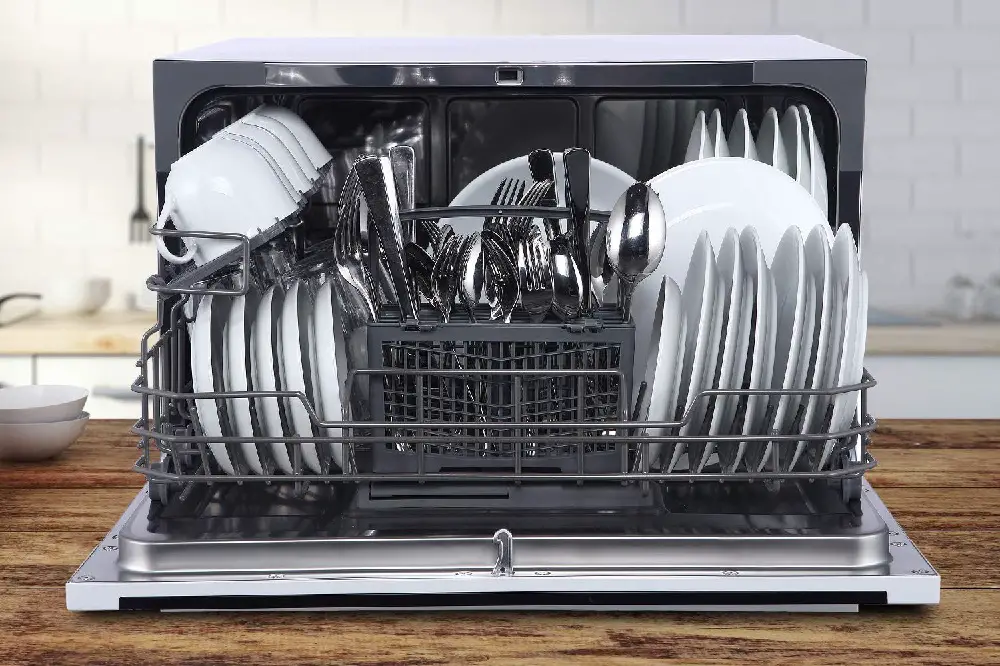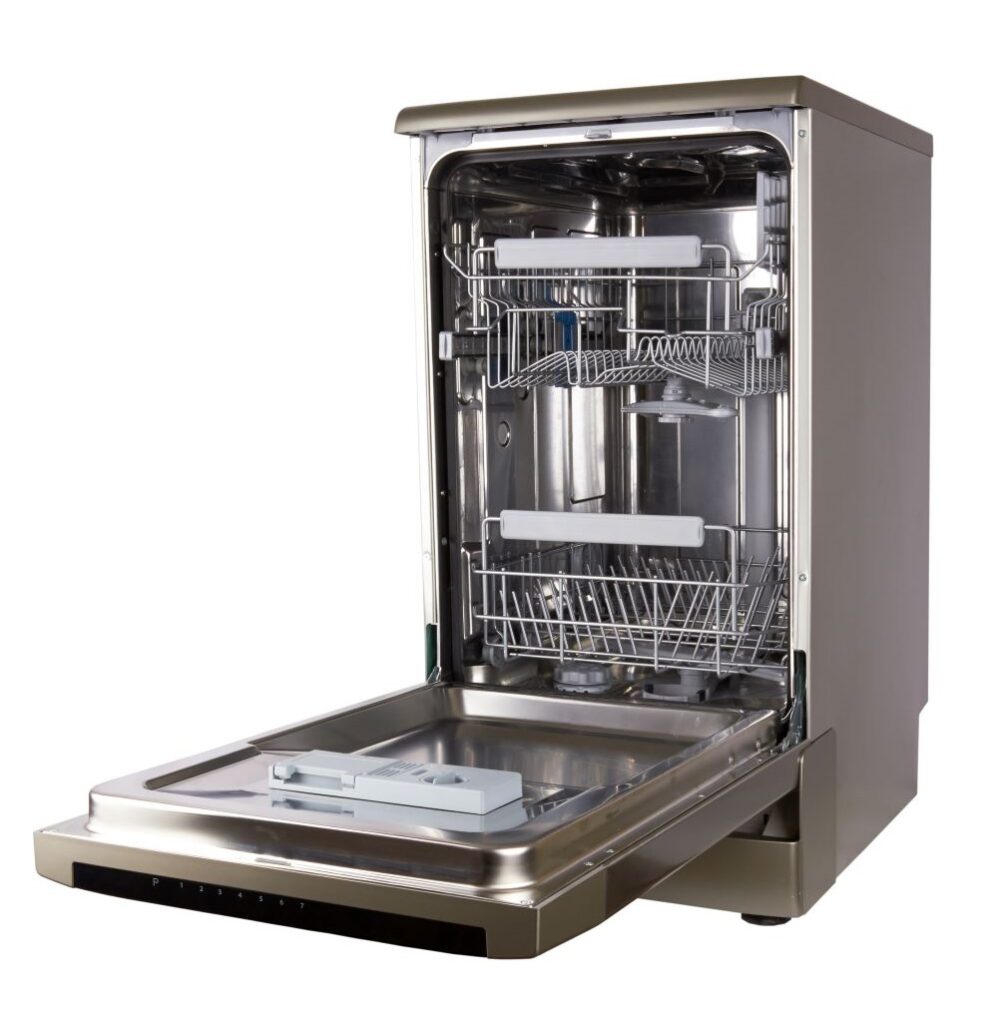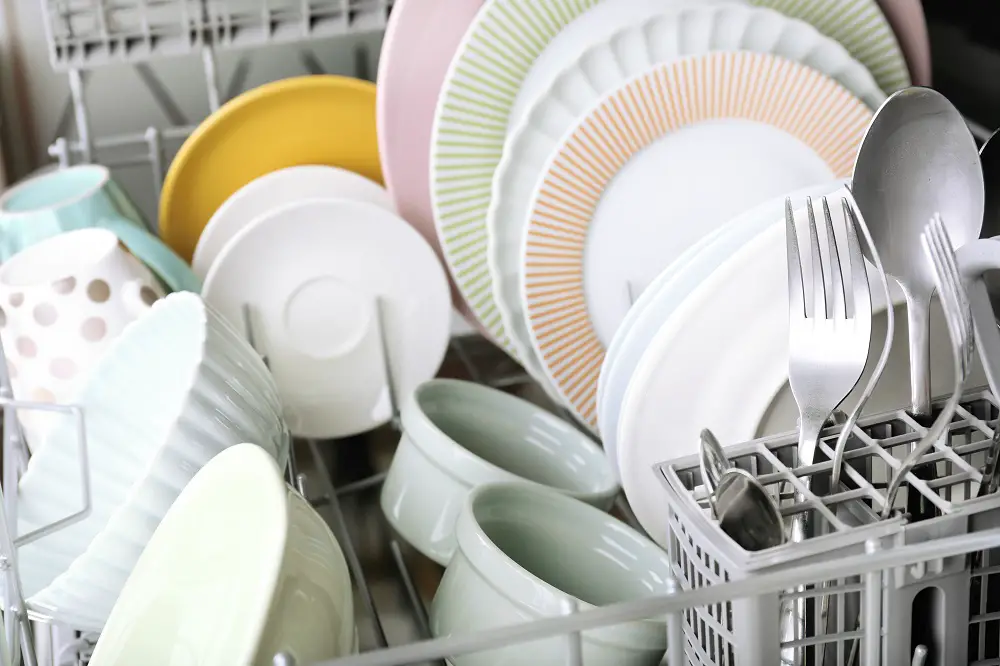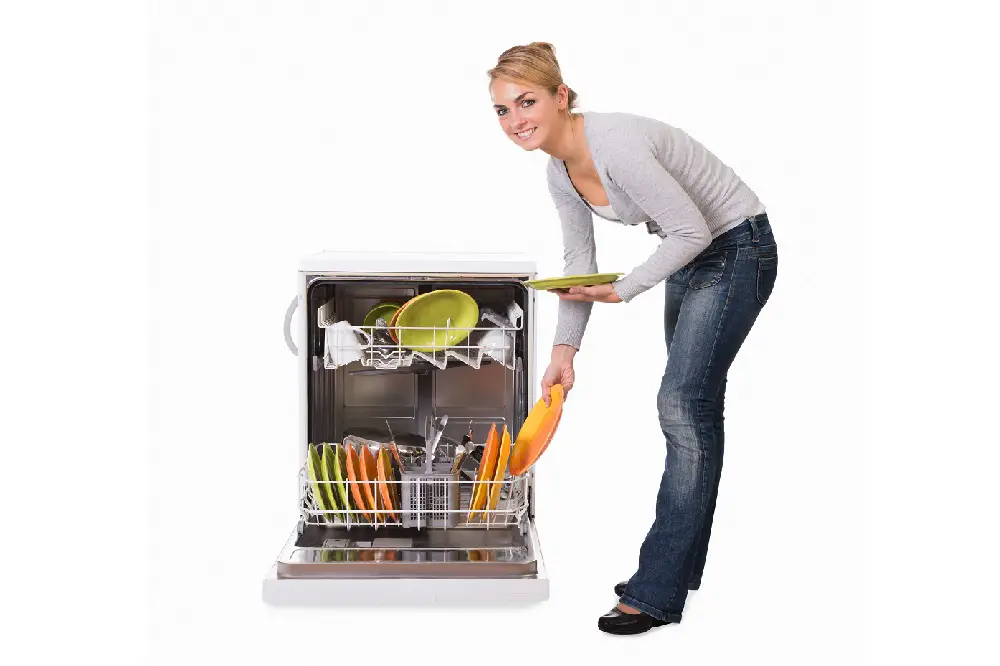Do you live in a smaller home or apartment without room for an under-the-counter dishwasher? Then a portable dishwasher is just what you need. So, what is a portable dishwasher, and how does it differ from the regular one?
Portable dishwashers are a relatively smaller and more portable version of built-in dishwashers. However, they’re designed to clean dishes and pots just as well. You can easily fit a portable appliance into tight spaces or move it from one spot to another.

Table of Contents
How Do Portable Dishwashers Work?
While portable dishwashers don’t require a permanent installation, they work similarly to regular ones.
A water inlet hose supplies water to the machine. If installed, the water flows through an internal water softener to the machine.
Suppose you have a hard water supply; consider installing a water softener system at the main supply point (this is useful for any dishwasher type).
The water is then heated to the appropriate temperature based on the cycle selection.
While most portable appliances have a built-in heater for this purpose, for the models that don’t, the water inlet must be connected to a geyser outlet for a hot water supply.
Then, the heated water is sprayed with pressure onto the dirty dishes via the rotating spray arms. This works with the detergent you load in the dispenser for effective cleaning.
After the wash and rinse cycles, the dirty water is expelled from the dishwasher through the drain hose.
Sometimes, a drying cycle is available and helps get your dishes dry.
Most modern dishwashers use a condensation method for this instead of heated air.
How Are They Different From a Regular Dishwasher?
A portable dishwasher differs from regular dishwashers in a few factors, like the following:
- Set-Up
Unlike regular dishwashers, portable models don’t require permanent hook-ups. In fact, you must set up the water and drain hoses of a portable dishwasher for each use.
Read more on How To Set Up A Countertop Dishwasher here.
- Size
While standard dishwashers are 24” wide, portable freestanding models come in 18” or 24”. And countertop models are about 16”-22” wide.
- Capacity
Most 18” freestanding dishwashers have 8-10 place settings, and the 24” models have a similar load capacity to built-in dishwashers (up to 16 place settings). However, countertops only have up to six place settings.
- Cost
The average cost of built-in dishwashers ranges between $300 – $1,000. Portable appliances cost comparatively less (freestanding cost: $400 – $700, countertop cost: $200 – $600).
- Energy Consumption
The more compact countertop dishwashers use slightly less energy than built-in dishwashers. In comparison, the freestanding models have approximately similar energy consumption as built-ins.
- Water Consumption
The smaller-size dishwashers, with a lower capacity, use less water than the standard-size models.
You may find the actual water consumption of portables interesting.
- Flexibility
Unlike regular dishwashers that are permanently fixed, portable dishwashers can be moved around. You can place it in a convenient location for use or storage.
- Noise Levels
Regular dishwashers are built into cabinets; therefore, they operate more quietly. However, there are a few silent portable models available, too.
If you’d like to know the detailed differences between portables and built-ins, here’s our article on built-in dishwashers vs. portable dishwashers.
Two Types of Portable Dishwashers: Countertop and Freestanding
Portable dishwashers come in two models – countertop dishwashers and freestanding dishwashers.
We do have a size guide for you that explains the differences and helps to find the right type.
Countertop dishwashers
These devices sit on the kitchen counter. While these models are portable, they’re typically kept in a dedicated spot on the counter. It’s best to place a countertop dishwasher close to the kitchen sink for ease of connection.

The inlet hose is hooked up to the sink faucet, and the drain hose is placed in the sink.
Some countertop dishwashers have a water reservoir you can manually fill; you don’t need to connect them to a faucet (although you could if required since they often have inlet hose provisions).
These models have a reduced capacity and can fit up to six place settings at a time.
Countertop dishwashers typically have a pull-out rack or drawer design.
They’re suitable for washing only dishes, cutlery, and cups; you can’t fit pots and pans into countertop dishwashers.
On the other hand, freestanding dishwashers are a slightly compact version of built-in dishwashers. They’re more spacious than countertop models and have a similar look and feel as the full-sized built-in dishwashers.
Freestanding dishwashers
The freestanding models have caster wheels, making it convenient to roll around the kitchen. You can store your portable appliance in the pantry or a corner between uses.

You must connect the water inlet hose and set up the dishwasher drain hose for each use.
Freestanding dishwashers come in two widths — the standard 24” (similar to built-in dishwashers) and the slimline 18” width.
You can also select butcher block top freestanding dishwashers; they can be used as an extension to your counter for meal preparation or storing lightweight items between uses.
Most freestanding dishwashers are convertible, meaning you can remove the caster wheels and convert them into built-in dishwashers. You’ll require a conversion kit and a few modifications around your counter to make hose provisions.
When Does a Portable Make Sense?
If you’re wondering when it might make sense to get a portable dishwasher, here are some points to help you decide:
- A portable model is a good option when you don’t have the space under the counter or provisions for setting up a built-in dishwasher.
- If you’re on a budget, portable dishwashers are the less expensive option and involve a hassle-free installation.
- Portable dishwashers are a better choice if you stay alone or are a family of two.
- A portable appliance makes sense if you’re often traveling or on the move.
- When you’re tight on floor space, a portable countertop dishwasher would be more suitable.
- If you’d like additional counter space, a portable butcher block top dishwasher is a good choice.
Conclusion
Portable dishwashers are the smaller, more portable version of built-in dishwashers. Not only do they ease your chore of washing dishes, but they also occupy much less space.
There are two types of portable dishwashers — countertops and freestanding models. While the setup of portable appliances may differ from regular dishwashers, they function similarly for washing dishes.
Consider getting a portable dishwasher if you’re tight on kitchen space, travel or move homes often, are on a budget, or stay alone or with a small family.



